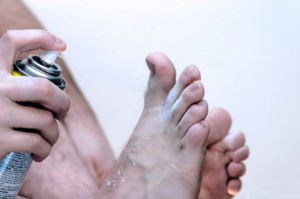Contracting athlete’s foot can happen to anyone, but there are some risk factors that increase the chance of contracting this inconvenient condition. Public places like locker rooms, showers, and swimming pools are breeding grounds for bacteria, so exposing your bare feet to surfaces in these environments could easily lead to athlete’s foot. Sharing footwear or towels with someone who has been infected can spread the infection, so it’s best to avoid sharing these items. Wet or sweaty feet are also at a higher risk than feet that are kept dry and clean, because bacteria thrive in moist environments. Minor skin or nail injuries, especially in tight closed-toe shoes are also a risk factor. If you think you might have athlete’s foot or would like additional information on how to prevent it, then it is suggested you speak with a podiatrist.
Athlete’s Foot
Athlete’s foot is often an uncomfortable condition to experience. Thankfully, podiatrists specialize in treating athlete’s foot and offer the best treatment options. If you have any questions about athlete’s foot, consult with Dr. Larry Cohen from New York City. Our doctor will assess your condition and provide you with quality treatment.
What Is Athlete’s Foot?
Tinea pedis, more commonly known as athlete’s foot, is a non-serious and common fungal infection of the foot. Athlete’s foot is contagious and can be contracted by touching someone who has it or infected surfaces. The most common places contaminated by it are public showers, locker rooms, and swimming pools. Once contracted, it grows on feet that are left inside moist, dark, and warm shoes and socks.
Prevention
The most effective ways to prevent athlete’s foot include:
- Thoroughly washing and drying feet
- Avoid going barefoot in locker rooms and public showers
- Using shower shoes in public showers
- Wearing socks that allow the feet to breathe
- Changing socks and shoes frequently if you sweat a lot
Symptoms
Athlete’s foot initially occurs as a rash between the toes. However, if left undiagnosed, it can spread to the sides and bottom of the feet, toenails, and if touched by hand, the hands themselves. Symptoms include:
- Redness
- Burning
- Itching
- Scaly and peeling skin
Diagnosis and Treatment
Diagnosis is quick and easy. Skin samples will be taken and either viewed under a microscope or sent to a lab for testing. Sometimes, a podiatrist can diagnose it based on simply looking at it. Once confirmed, treatment options include oral and topical antifungal medications.
If you have any questions, please feel free to contact our office located in Midtown, Manhattan . We offer the newest diagnostic and treatment technologies for all your foot care needs.








